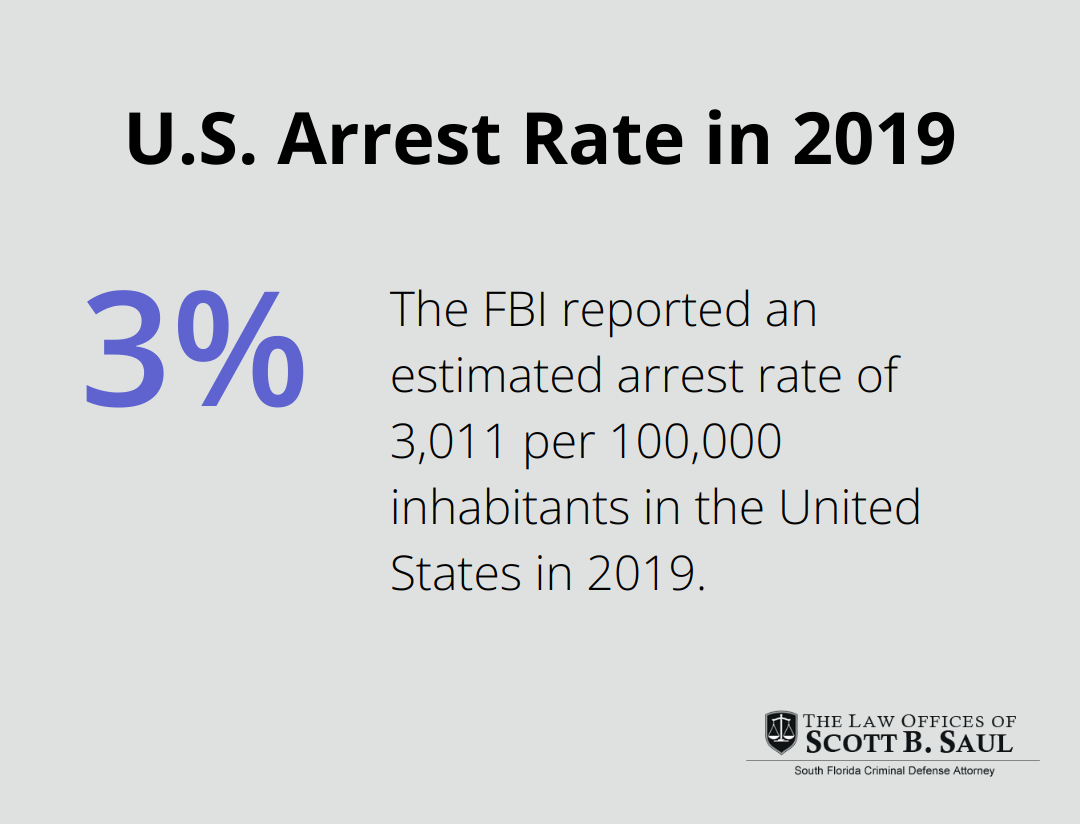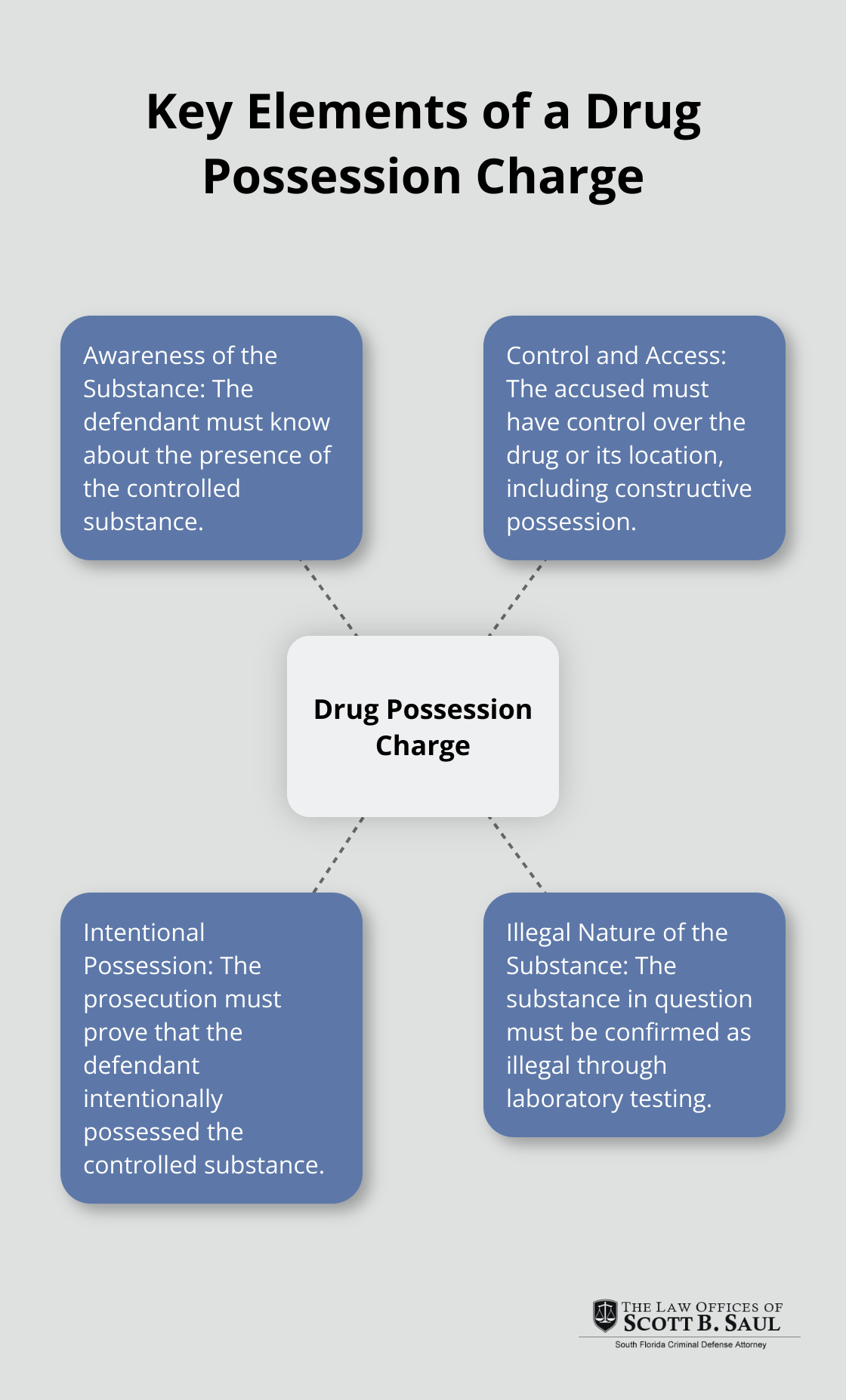What Is Drug Possession? Legal Definition Explained
By : saulcrim | Category : Criminal Defense | Comments Off on What Is Drug Possession? Legal Definition Explained
26th Jun 2025

Drug possession is a serious offense that can have far-reaching consequences. At Law Offices of Scott B. Saul, we often encounter clients grappling with the complexities of drug possession charges.
Understanding the legal definition of drug possession is crucial for anyone facing such allegations. This post will break down the key elements of drug possession charges and their potential implications.
What Constitutes Drug Possession?
Legal Definition of Possession
Drug possession extends beyond merely having drugs on your person. In legal terms, possession means having control over a substance. This control can take two forms: physical or constructive. Understanding this distinction is essential for anyone facing drug possession charges.
Physical vs. Constructive Possession
Physical possession occurs when drugs are found directly on an individual (e.g., in a pocket or hand). Constructive possession applies when a person has access to and control over an area where drugs are found, even if not on their person. For example, drugs discovered in a car’s glove compartment or a bedroom drawer could lead to constructive possession charges.
Common Substances in Possession Cases
Drug possession cases involve a wide range of substances. Despite changing laws in many states, marijuana remains a frequent subject of these charges. More serious cases often involve cocaine, heroin, and methamphetamine. Prescription drugs (particularly opioids) increasingly feature in possession charges, reflecting the ongoing opioid crisis.
Legal Implications of Possession
Drug possession carries severe legal consequences. The FBI’s Uniform Crime Reporting Program reveals that the estimated arrest rate for the United States in 2019 was 3,011.0 arrests per 100,000 inhabitants. These statistics highlight the importance of understanding what constitutes possession.

The Role of Intent in Possession Charges
Intent plays a pivotal role in drug possession cases. Prosecutors must prove that an individual knowingly possessed the substance and was aware of its illegal nature. This aspect of the law underscores the importance of skilled legal representation in challenging the prosecution’s claims about intent and knowledge.
As we move forward, it’s important to examine the specific elements that comprise a drug possession charge. These elements form the foundation of the prosecution’s case and understanding them is key to mounting an effective defense.
Key Elements of a Drug Possession Charge
Drug possession charges involve complex legal matters that require a thorough understanding of several key components. Prosecutors must prove specific elements to secure a conviction. This chapter examines these critical aspects of drug possession charges.

Awareness of the Substance
The first element prosecutors must establish is the defendant’s knowledge of the drug’s presence. This means proving that the accused knew they had a controlled substance in their possession. For instance, if law enforcement finds drugs in a borrowed car, the prosecution needs to show that the driver knew about the drugs’ existence.
Control and Access
Prosecutors must demonstrate that the defendant had control over the drug or its location. This element ties into the concept of constructive possession (discussed earlier). If authorities discover drugs in a shared living space, prosecutors will attempt to prove that the accused had access to and control over the area where they found the drugs.
Intentional Possession
Intent plays a critical role in drug possession cases. The prosecution must show that the defendant intentionally possessed the controlled substance. This can present challenges, especially in cases where authorities find drugs in shared spaces or vehicles.
Illegal Nature of the Substance
Lastly, the prosecution must prove the illegal nature of the substance in question. This typically involves laboratory testing to confirm the drug’s composition. To evaluate the threat of illicit drugs, analysts consider quantitative and qualitative information, including data on seizures and investigations.
Understanding these elements proves essential for anyone facing drug possession charges. Each component presents opportunities for defense strategies. For example, challenging the prosecution’s evidence on any of these elements can significantly impact the outcome of a case.
As we move forward, it’s important to consider the potential penalties and consequences that can result from a drug possession conviction. These ramifications extend far beyond the immediate legal proceedings and can have long-lasting effects on various aspects of an individual’s life.
The Real Cost of Drug Possession
Drug possession convictions carry severe penalties that extend far beyond the courtroom. The consequences can alter lives, impacting everything from personal freedom to future opportunities.
Sentencing Factors
Judges consider several factors when determining sentences for drug possession. The type of drug plays a significant role. For instance, possession of Schedule I substances (like heroin) typically results in harsher penalties than possession of Schedule V drugs. The amount of the drug also matters. Larger quantities often lead to more severe sentences, as they may suggest intent to distribute.
Prior offenses heavily influence sentencing decisions. First-time offenders might receive more lenient sentences, while repeat offenders face stiffer penalties.
Immediate Legal Consequences
Fines for drug possession can be substantial. Imprisonment is another common penalty. The length of incarceration varies widely based on the factors mentioned earlier.
Some jurisdictions offer alternative sentencing options. Drug courts have shown promising results, with evaluations finding reductions in rearrest rates by drug court participants that were 10-30 percentage points lower.

Long-Term Repercussions
The effects of a drug possession conviction extend far beyond the courtroom. Employment opportunities often diminish significantly. Many employers conduct background checks, and a drug conviction can be a major red flag.
Housing options may also become limited. Many landlords and public housing authorities screen for criminal records. A drug conviction can make it challenging to secure stable housing. This instability can lead to a cycle of poverty and increased risk of recidivism.
Education opportunities can suffer as well. Federal student aid eligibility may be suspended for drug-related offenses. While recent changes have eased some restrictions, a drug conviction can still impact a student’s ability to pursue higher education.
Social and Psychological Impact
The stigma associated with drug convictions can have lasting social and psychological effects. It can strain relationships, lead to social isolation, and contribute to mental health issues.
At Law Offices of Scott B. Saul, we understand the gravity of these consequences. Our approach focuses on minimizing these impacts through aggressive defense strategies and exploring all available legal options. We believe in second chances and work tirelessly to protect our clients’ futures.
Final Thoughts
Drug possession extends beyond physical control to include constructive possession, where access to an area containing drugs can lead to charges. The prosecution must prove knowledge, control, intent, and the illegal nature of the substance to establish a drug possession definition. Penalties for drug possession can severely impact immediate freedom and long-term prospects in employment, housing, and education.
The intricacies of drug laws and the potential for life-altering consequences make professional legal representation invaluable. At Law Offices of Scott B. Saul, we bring over three decades of experience in criminal defense to protect our clients’ rights. Our expertise in cases involving tourists and foreign travelers, combined with our aggressive representation, can make a significant difference in case outcomes.
A drug possession charge doesn’t have to define your future. With the right legal strategy and representation, you can navigate this challenging situation and work towards the best possible outcome. If you face drug possession charges, seek professional legal counsel to protect your rights and your future.
Archives
- January 2026 (8)
- December 2025 (9)
- November 2025 (8)
- October 2025 (8)
- September 2025 (9)
- August 2025 (8)
- July 2025 (8)
- June 2025 (9)
- May 2025 (9)
- April 2025 (8)
- March 2025 (9)
- February 2025 (8)
- January 2025 (9)
- December 2024 (10)
- November 2024 (5)
- July 2024 (2)
- June 2024 (2)
- May 2024 (2)
- April 2024 (2)
- March 2024 (2)
- February 2024 (2)
- January 2024 (2)
- December 2023 (2)
- November 2023 (2)
- October 2023 (2)
- September 2023 (2)
- August 2023 (1)
- July 2023 (2)
- June 2023 (2)
- May 2023 (2)
- April 2023 (2)
- March 2023 (2)
- February 2023 (2)
- January 2023 (2)
- December 2022 (2)
- November 2022 (2)
- October 2022 (2)
- September 2022 (2)
- August 2022 (2)
- July 2022 (2)
- June 2022 (2)
- May 2022 (2)
- April 2022 (2)
- March 2022 (2)
- February 2022 (2)
- January 2022 (2)
- December 2021 (2)
- November 2021 (2)
- October 2021 (2)
- September 2021 (2)
- August 2021 (2)
- July 2021 (2)
- June 2021 (2)
- May 2021 (2)
- April 2021 (2)
- September 2020 (5)
- July 2020 (4)
- June 2020 (4)
- May 2020 (4)
- April 2020 (5)
- March 2020 (4)
- February 2020 (4)
- January 2020 (4)
- December 2019 (1)
- November 2019 (4)
- October 2019 (4)
- September 2019 (4)
- August 2019 (4)
- July 2019 (5)
- June 2019 (4)
- May 2019 (4)
- April 2019 (4)
- March 2019 (4)
- February 2019 (4)
- January 2019 (4)
- December 2018 (4)
- November 2018 (5)
- October 2018 (5)
- September 2018 (4)
- August 2018 (4)
- July 2018 (7)
- June 2018 (4)
- May 2018 (4)
- April 2018 (8)
- March 2018 (4)
- February 2018 (4)
- January 2018 (4)
- November 2017 (4)
- October 2017 (4)
- September 2017 (4)
- August 2017 (7)
- July 2017 (6)
- June 2017 (4)
- May 2017 (4)
- April 2017 (4)
- March 2017 (4)
- February 2017 (7)
- January 2017 (4)
- December 2016 (7)
- November 2016 (4)
- October 2016 (4)
- September 2016 (10)
- August 2016 (4)
- July 2016 (4)
- June 2016 (4)
- May 2016 (4)
- April 2016 (4)
- March 2016 (4)
- February 2016 (7)
- January 2016 (4)
- December 2015 (5)
- November 2015 (4)
- October 2015 (7)
- September 2015 (4)
- August 2015 (4)
- July 2015 (13)
- June 2015 (9)
- May 2015 (8)
- April 2015 (6)
- March 2015 (4)
- February 2015 (4)
- January 2015 (4)
- December 2014 (4)
- November 2014 (4)
- October 2014 (4)
- September 2014 (3)
Categories
- Adjudication (1)
- Bankruptcy (1)
- Burglary Crimes (3)
- calendar call (1)
- Car Accident (1)
- Criminal Defense (389)
- Cyber Crimes (7)
- DNA (1)
- Domestic Violence (9)
- Drug Crimes (5)
- DUI (12)
- Embezzlement (1)
- Environmental Crimes (4)
- Expungement Law (2)
- Federal Sentencing Law (3)
- Firearm (3)
- Forgery (4)
- General (82)
- Healthcare (3)
- Immigration (1)
- Indentity Theft (1)
- Insurance (5)
- judicial sounding (2)
- Juvenile Crimes (4)
- Manslaughter (4)
- Money Laundering (3)
- Organized Crime (1)
- Racketeering (1)
- Reckless Driving (3)
- RICO (3)
- Sealing and Expunging (2)
- Sex Offense (1)
- Shoplifting (1)
- Suspended Driver's License (1)
- Traffic (4)
- Trending Topics (1)
- White-collar Offenses (1)

